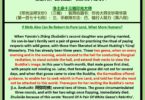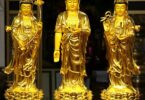[92] How Our Aunt Learnt Mindfulness Of Buddha In Time
我们的阿姨如何及时学了念佛
Before Aunt M got very sick, over almost two decades, on the occasions we would see each other during family gatherings, we had little interaction. Perhaps this was because we had few common interests, and were both too shy (i.e. so-called ‘paiseh’) to make small talk to know each other better, even barely making eye contact. However, although we did not have a single proper chat, there was still a sense of good will towards each other.
In the first quarter of 2022, there was talk among family members that she had lost much weight quickly. This was shocking because she has been severely overweight for many years – partly due to heavy meat-consumption, with little eating of greens and such, according to another Aunt who lived with her. During a visit to the family doctor, due to uncertainty of what was happening, she was encouraged to do a more detailed checkup at a hospital, which she declined.
Perhaps she kind of knew that she was not doing well, that something serious was happening. There was probably hiding of other symptoms and discomfort too, to prevent family members from worrying. At one point, she became too weak to stand by herself, effectively becoming bedridden at home. This was when family members decided that she must have a hospital checkup. An ambulance had to be called.
The diagnosis was stage 4 of ovarian cancer. (One of the possible symptoms of cancer is quick loss of weight, as cancer cells require more energy than healthy ones, thus with the body burning more calories at rest than usual. Cancer cells also release substances that affect how the body use calories from food.) It is now hard to tell if earlier discovery could have saved her life in time. But this does not really matter now, as we will see.
She seemed to take the diagnosis in her stride, not wallowing in misery, while still harbouring some hope of recovery. During her second and final hospital stay, on a better day, she even said that when she leaves the hospital, she will live a simpler life. At the same time, she seemed kind of mentally prepared for her condition to worsen. As she had to wait for her scheduled chemotherapy after the first hospital visit, she was sent home. This was when I thought it is high time to share the benefits of mindfulness of Buddha (念佛) with her.
Although I have already shared with around 2,500 folks from all walks of life on Pure Land practice in many classes and talks, this was still a challenge. This is because those who came to class are clearly already interested, while those who did not come might not be. In the worst-case scenario, there might even be annoyance and rejection. Even my spouse, who is her niece, reminded me to not have have high expectations of having her responding well. Despite this, I thought we must still encourage her to be mindful of the Buddha. What more, with stage 4 already, this is no time to hesitate, to be shy.
One evening, with my spouse, her younger brother and wife, all of whom attended my Pure Land classes before, for offering Aunt M moral support, we visited her at home. She was too weak to be on her feet, though energetic enough to listen and speak normally. After a brief exchange of greetings, I smiled and said, (as roughly remembered, in a mix of Chinese and English), ‘通常,我们如果有重病,看了医生后,就应该诚心念”阿弥陀佛”,用念佛消业障。如果可以痊愈,就会更快痊愈。’ (Usually, when we are seriously sick, after following medical advice, we should sincerely recite the name of ‘Āmítuófó’. With mindfulness of Buddha to eliminate karmic obstacles, if there can be complete recovery, there will be faster complete recovery.‘)
‘我们班上有一位佛友,几年前得了乳癌。我们也鼓励她要一心念佛。她当晚就诚心念佛,还看到了阿弥陀佛的黄金光。同时有看医生,她后来也痊愈了。’ (In our classes, we have a Buddhist friend, who had cancer some years ago. We also encouraged her to wholeheartedly be mindful of the Buddha’s name. That night, she saw Āmítuófó’s golden light. Also with treatment, she later completely recovered.) (There was also encouragement to go vegan in the Buddhist way, to further facilitate possible healing: https://TheDailyEnlightenment.com/veg.) This case can be seen at https://purelanders.com/2016/04/22/testimonial-embraced-by-amituofos-golden-light. As remarked to the Purelander who wrote the testimony, ‘It’s really amazing how sharing of one experience can inspire more and more. You can in turn share this sharing connected to your sharing, to inspire more family and friends!’ As in turned out, Aunt Molly’s case would inspire another case merely five months later: https://purelanders.com/2023/02/07/95-how-i-did-my-best-to-guide-my-father-to-pure-land.
[It was later said that Aunt M already could not digest meat, and could only take mostly vegetable soups. I can’t remember if I encouraged her to go vegan during the home visit (as she was a heavy meat-eater), but if I did, I should have said something along this line – ‘最好也吃素,至少吃多点蔬菜,少点肉。’ (It is best to go vegan, to at least eat more greens, with less meat.) Seeing the dairy nutritional milk given for consumption at home, the healthier vegan version, especially for cancer patients was offered. Unfortunately, she did not like the taste.]
I tried to sound hopeful and enthusiastic, to be more encouraging, to not be preachy. Deep down, I was somewhat apprehensive, due to uncertainty of her reception, hoping that I will be using the right words skilfully. Thankfully and surprisingly, she was attentive and receptive. However, merely saying the above was not enough. While offering hope, this might end up creating the no longer realistic expectation of recovery. The most challenging part to share is on preparation for possible death, as some might see death to be a dreadful taboo subject, that is inauspicious and even rude to talk about.
Next, I continued, ‘如果时间到了要走,也不要紧。只要继续一心念佛,念到见佛,跟佛到他的极乐世界。到了那里,就没有病苦。我们迟早也要去。我们都要去!’ (If time is up, for departure, it is still alright. Just continue to be wholeheartedly mindful of the Buddha’s name, until the Buddha is seen, to follow the Buddha, to reach his Pure Land Of Ultimate Bliss. Reaching there, there will be no more sickness and suffering. We all, sooner or later, also will go there. We all want to go there too!) (Complete and lasting recovery with immeasurable life is attained in Pure Land.) When I spoke the last line, ‘We all want to go there too!’, I gestured towards all four of us present, as we smiled and nodded enthusiastically in agreement.
She was also agreeable, and remarked that it would be wonderful if the Buddha’s light could be seen. I said that we just have to be as sincere as possible when reciting his name, with no need to think about anything else, such as pain and discomfort, as such fixations will only worsen matters. With sincere mindfulness of Buddha, pain will disappear, and even be replaced by bliss. We passed a Buddha recitation device (念佛机), which was plugged in immediately and turned on at a low but audible volume, encouraging her to follow it, to recite the Buddha’s name as much as possible, verbally or mentally.
To our pleasant surprise, there was already an A4-sized Āmítuófó picture on the wall she faced, which we adjusted for her more direct line of sight, as a reminder to be mindful of his name. The picture present meant she was already open to the Buddha. I also gave her a Chinese-English copy of the Amitābha Sūtra《阿弥陀经》we use for class, to read for more understanding, by using the footnotes available too. (The sūtra without footnotes can be seen at https://purelanders.com/sutra.)
The very next day, we heard that she also saw golden light when mindful of the Buddha’s name in her room! (The Aunt living with her, who is also mindful of the Buddha in daily life saw golden light too!) The seeing of light would recur several times during the hospitalisation later. The Buddha recitation device was brought to the hospital too, with it on around the clock, to remind and guide her to be mindful of the Buddha. Once in the hospital, she saw a man some distance away, but looking at her, chanting the Buddha’s name, as if to remind her to do so too. It was as if an unknown manifested support-chanter. (Since the motivation was clear and good, there was nothing to be afraid.)
With easing of rules due to ebbing of the COVID-19 pandemic, there could be more visitors, which fortunately made it easier to facilitate support-chanting among the few of us, including my spouse’s sister, who also came to our Pure Land classes before. Although yet to come to class, her elder brother also joined in, but found it challenging to chant long. (Her younger brother thought that this was probably due to lack of adequate prior practice, which is important in everyday life, especially to prepare for occasions like these.)
A Śūraṅgama Mantra《楞严咒》pendant was given to Aunt M for protection. As taught by the Buddha in the Śūraṅgama Sūtra《楞严经》, ‘Wholeheartedly encourage and enable upholding of my Buddha Crown’s Dhāraṇī [Śūraṅgama] Mantra. If there are those yet able to recite it, writing it for placing in their meditation halls to prevent supernatural disturbances during spiritual practice, or wearing it on their bodies, they are by all demonic beings, not able to be touched.’ (一心劝令,持我佛顶陀罗尼【楞严】咒。若未能诵,写于禅堂,或带身上,一切诸魔,所不能动。) For more on using the mantra, see https://purelanders.com/2021/04/11/how-to-help-the-possessed-with-mindfulness-of-buddha.
Although already very light, if not comfortable using the Rebirth Blanket (往生被) for protection against possible malevolent unseen beings around, (who could be karmic creditors [冤亲债主]), the mantra should at least be worn, for constant protection. Unlike the blanket, which might be accidentally kicked aside when tossing and turning, one can be with the worn mantra pendant all the time. Although it is best to be mindful of the Buddha all the time for direct protection, as this is difficult or impossible when resting, the pendant is especially useful then. That said, the consciousness departed from the body upon death cannot wear the pendant. Thus, mindfulness of Buddha is still needed for protection and for reaching his Pure Land.
Support-chanting (助念) began intermittently in May. As the cancer spread to her lungs, she became ‘semi-conscious’ when given painkillers, less able to communicate clearly. This was when the Rebirth Blanket was placed above the normal blanket for extra protection and to further help eliminate evil karma. During her conscious periods, we took turns to offer support-chanting louder, with offering of guidance (开示) to remind on the right attitude and practice to have on the hour. When sleeping, there would be softer or silent support-chanting, as departure is still possible then. I can’t remember if there was reminder to follow the Buddha’s name played by the Buddha recitation device in the mind when there was no one doing support-chanting, but this should have been done.
When she appeared confused, perhaps with some hallucinations and memory flashbacks, with gesturing and mumbling, there would be reminding of her to close her eyes, and to only follow the Buddha’s name sincerely in her mind, until the Buddha comes, to follow him to reach his Pure Land. At times, she would calm down to clasp her hands (which is easier than placing palms together), seeming following the chanting. Although unmarried and thus without children, her Purelander nieces and nephews functioned like her filial children, to guide her on her final journey. (In a sense, this is from her good karma, from having been a caring Aunt since young.)
Her breathing became increasingly laboured as time went by. When some friends and relatives visited, there had to be reminders to just recite the Buddha’s name to create more blessings for her, instead of touching her (which will cause magnified pain), or talking to her about worldly matters (which might create agony from attachment), such as asking her to ‘wake up’, to acknowledge their presence, and to ‘strive on to survive’. Such talk is stressful and meaningless to the dying, adding needless burdens and distractions when there is little energy left.
There was also gentle ‘chiding’, telling her to just move on. This is also pointless. If we can just depart from life at will when sick, which dying person with much suffering will not do so instantly? Deathbed suffering that goes on for a while is karmic in nature, due to lack of firm connection to the Buddha at the moment too. Although her siblings were not familiar with support-chanting, thankfully, there were no objections.
Above were the most challenging phases of her journey to Pure Land, with need to carry on with guidance and support-chanting that outlast the period with suffering and confusion, without giving up, over about two and a half days. Perhaps with more seamless support-chanting, smooth departure could have been sooner. This is why having a shift system with adequate support-chanters, especially among family members, who are naturally more committed is important. Gradually, her fidgeting and gasping subsided. She was very near her final moments. Throughout the last night, there was on and off support-chanting by an Aunt and my spouse’s sister. On her last morning began the last stretch of uninterrupted support-chanting.
Even if the pre-departure period seems difficult and prolonged, each recitation of the Buddha’s name will directly create meritorious virtues (功德) to lessen the patient’s suffering, and once there is death, even if yet to connect to the Buddha, there will be no more physical suffering and mental confusion from medication (or brain-related illnesses). This is when guidance given will be understood extra clearly by the consciousness. This should be followed by ample support-chanting to encourage utmost sincere mindfulness of Buddha. Thus, it is important to be present during the passing moment, to re-offer guidance once breathing ends, before resuming with support-chanting. We should simply focus and press on wholeheartedly and accordingly, from pre-departure to post-departure, as there is nothing else more worthy to do then.
(As the hospital was actually a hospice, in Singapore, it had to cater to all religions, thus allowing ample time for post-death chanting.) As post-death support-chanting went on, her expression became more and more peaceful. By the end of the eight hours, with slight rosiness and stateliness, as if in her prime too, we realised that she never looked better, not even when well before. This is called the ‘facial appearance like when alive’ (面相如生), which expresses the state of well-being.
When her body was handled by the nurses, when a hand slipped a little, we noticed that it was ‘gentle and soft’ (柔软), which reflected peace and bliss (安乐) of mind. With these simple yet clear auspicious signs (瑞相), there was great rejoice and relief for all. This was the first time family members practised support-chanting that spanned from the dying state to eight hours beyond death. My spouse even lost her voice for a short while.
When her body was sent to the void deck of the block she lived for the wake, relatives saw her final expression during encoffining. I remarked to her sister, who is my spouse’s mother, ‘Her wonderful appearance is due to mindfulness of Buddha, without need for make-up!‘ She misheard and replied, ‘Yes indeed, the make-up is wonderfully done!’ I immediately corrected her, by saying, ‘No, no! There was no make-up at all. No embalmment was done!’ (Embalmment should be avoided to minimise touching and moving the body.) Hearing this, she was pleasantly astonished. She then enthusiastically told relatives that there was no make-up applied. Now, she practises mindfulness of Buddha daily. This experience helped to inspire the faith of the rest of the family greatly, on the power of mindfulness of Buddha.
At the wake, with great thanks to all Purelanders who attended, we invited Pureland Practice Fellowship (PPF) friends to offer a session of support-chanting, according to our usual practice: https://purelanders.com/wake. The atmosphere at the wake was light and joyous throughout, with no heavy feelings of grief. It was like a sending-off ceremony, knowing she is in the ideal place, not an occasion of bereavement at all.
On the chartered bus going to the crematorium, to impress upon the minds of all relatives and friends to be mindful of the Buddha for Aunt M (and themselves), we played the powerful portable speaker use for PPF support-chanting. We used it throughout the wake too. As we witnessed the casket entering the furnace area, it was also played aloud, to drown out any potential crying, to remind all to be mindful of the Buddha one ‘last’ time. After cremation, when sorting her ashes, to our great surprise, there were bluish, greenish and purplish śarīra flowers (舍利花), (which are relics attached to bone fragments, seemingly about to become separate relics [舍利子]) that resembled light turquoise gemstones. (See picture for some examples.)
Aunt M’s case testifies to the truthfulness of what the Buddha taught in the Contemplation Sūtra《观经》, that those when approaching life’s end, who meet good-knowing friends (善知识), who encourage mindfulness of Buddha, (even during the last few months, weeks, days and minutes of life), are still able to help connect the dying to the Buddha, for rebirth in his Pure Land – if they are able to give rise to the Three Provisions (三资粮) of Faith, Aspiration and Practice (信愿行) in time. Even though she did not come to any of our Pure Land classes, it was as if we learnt Pure Land practice on her behalf, for sharing it with her confidently in time, so as to inspire her own confident practice, with which she reached Pure Land – before all of us!
When she was alive, just a few years ago, when some family members were successfully encouraged to take the Threefold Refuge (三皈依) together, Aunt M was invited too, but she declined, for reasons unknown. Back then, I thought this was ‘not very auspicious’, as if it ‘represented’ rejection of the Buddha and his teachings. Thank goodness, I was not negatively judgemental in a conclusive way, or I might not have been as insistent and enthusiastic in encouraging her to be mindful of the Buddha.
This is a reminder to all, to not give up before trying, to urge family, friends and even strangers to embrace mindfulness of Buddha. We should never assume it will be too difficult to encourage someone to do so, or imagine that person lacks affinity with the Buddha. Even if so, you might be the crucial link, offering the supporting condition (助缘) needed. You will never really know until you try your best! And having tried your best, you will surely have no regrets. Āmítuófó!
相关教理
Related Teachings:
《临终三大要》
The Three Great Essentials When Approaching Death
https://purelanders.com/now
Embraced By Āmítuófó’s Light
https://purelanders.com/2016/04/22/testimonial-embraced-by-amituofos-golden-light
How To Help The Possessed With Mindfulness Of Buddha
如何以念佛帮助被附体者
A Buddhist ‘Exorcism’ Method
一个佛教祛鬼降魔的妙法
https://purelanders.com/2021/04/11/how-to-help-the-possessed-with-mindfulness-of-buddha
《观经》
Contemplation Sūtra
https://purelanders.com/guanjing
死亡前后与丧礼中后的诵念
Chanting When Dying, After Death, During And After Wakes
https://purelanders.com/wake
大乘纯素法
The Great Vehicle’s Vegan Way Of Life
https://TheDailyEnlightenment.com/veg





